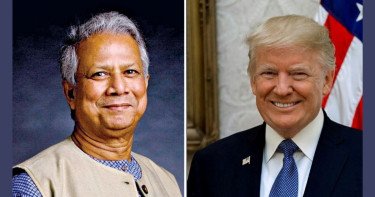Chief Adviser to Bangladesh, Professor Muhammad Yunus, has called on U.S. President Donald Trump to delay the imposition of a 37% tariff on Bangladeshi exports for three months.
This request is aimed at providing the interim government with enough time to implement initiatives designed to boost U.S. exports to Bangladesh.
In a letter sent on Monday, Yunus expressed his hope that President Trump would grant the delay, ensuring a smooth execution of the efforts to increase American exports. The U.S. government recently imposed a 37% tariff on Bangladeshi exports, arguing that the tariffs Bangladesh imposes on U.S. goods are significantly higher.
In response, Yunus highlighted that Bangladesh had already taken proactive steps to strengthen trade relations with the U.S., including sending a high representative to Washington shortly after Trump’s inauguration to discuss increasing U.S. exports to Bangladesh’s rapidly growing market. Yunus also noted that Bangladesh was the first country to sign a multi-year agreement to import liquefied natural gas (LNG) from the U.S. and has continued to explore other trade opportunities since the Trump administration lifted the freeze on LNG export permits.
Yunus outlined specific actions Bangladesh is taking, including plans to significantly increase imports of U.S. agricultural products such as cotton, wheat, corn, and soybean, benefiting American farmers. Additionally, Bangladesh is establishing a bonded warehousing facility for duty-free access to U.S. cotton and reducing tariffs on key U.S. exports like gas turbines, semiconductors, and medical equipment.
The chief adviser emphasized that Bangladesh is also removing non-tariff barriers to U.S. exports, simplifying customs procedures, and implementing trade facilitation measures. These efforts are expected to accelerate U.S. business activity in Bangladesh, particularly in sectors like advanced technology, civil aviation, and defense.
Yunus concluded his letter by requesting a three-month delay on the 37% tariff to allow Bangladesh to complete these initiatives in consultation with U.S. officials.



